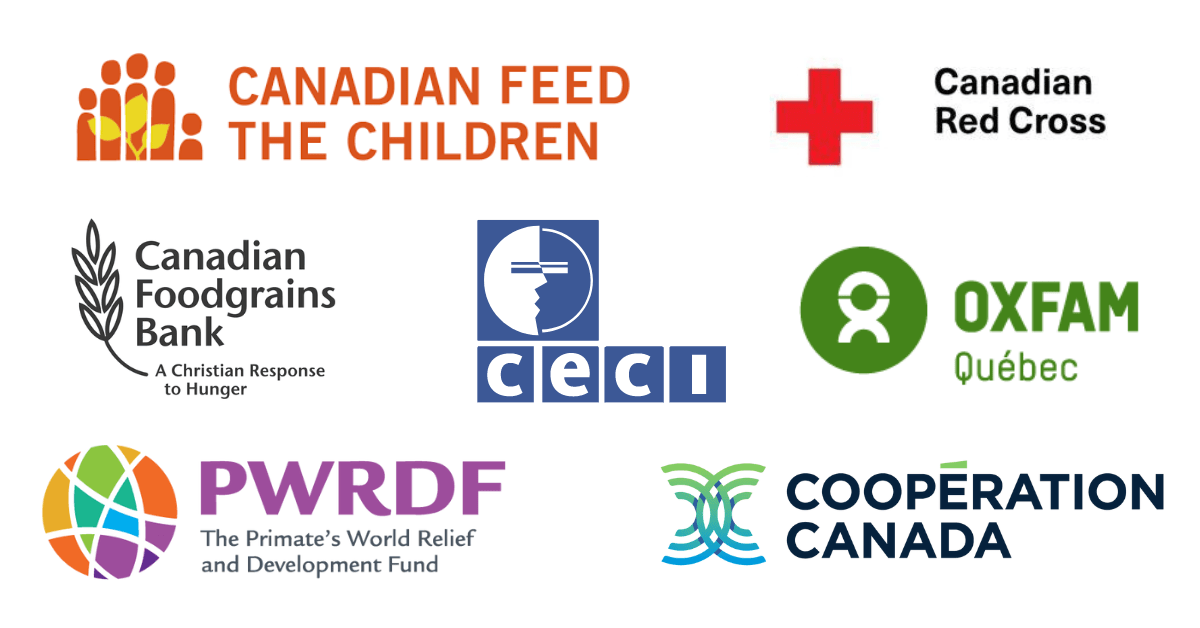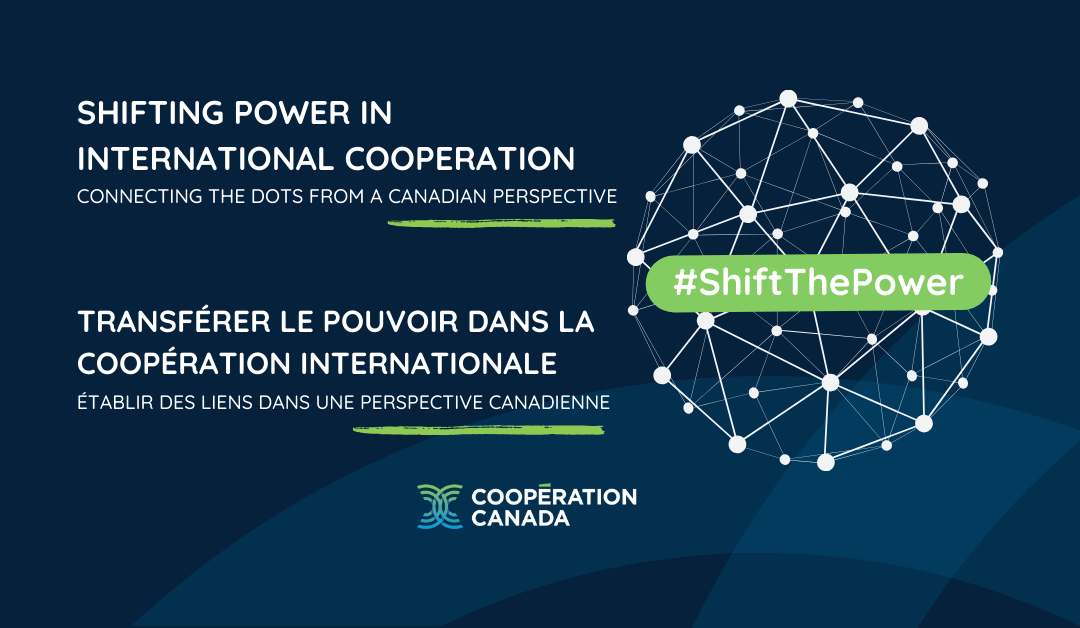
by Cooperation Canada | Dec 14, 2023 | Localization, News
On November 20-21, 2023, Cooperation Canada invited its members to discuss ways to move the powershift agenda from words to action. The specific objectives were to provide background and exchange perspectives on issues relating to changing roles for Canadian INGOs in responding to the power shift agenda and brainstorm and generate practical ideas to accelerate the operationalization of the power shift agenda in Canada, including by exploring the idea of a dedicated hub or community of practice.
Prior to the workshop, members of Cooperation Canada had received an advanced copy of the working paper entitled Shifting Power in International Cooperation: Connecting the Dots. The paper defines the key terms and arguments related to shifting power in international cooperation, presents the transforming unfolding in the Global North and the Global South, then describes Canadian actors, among others, are doing to advance the power shift agenda.
The first day of the workshop set the scene on the powershift agenda, starting with participants summarizing the concept of shifting power in two words, as illustrated by the word cloud below.
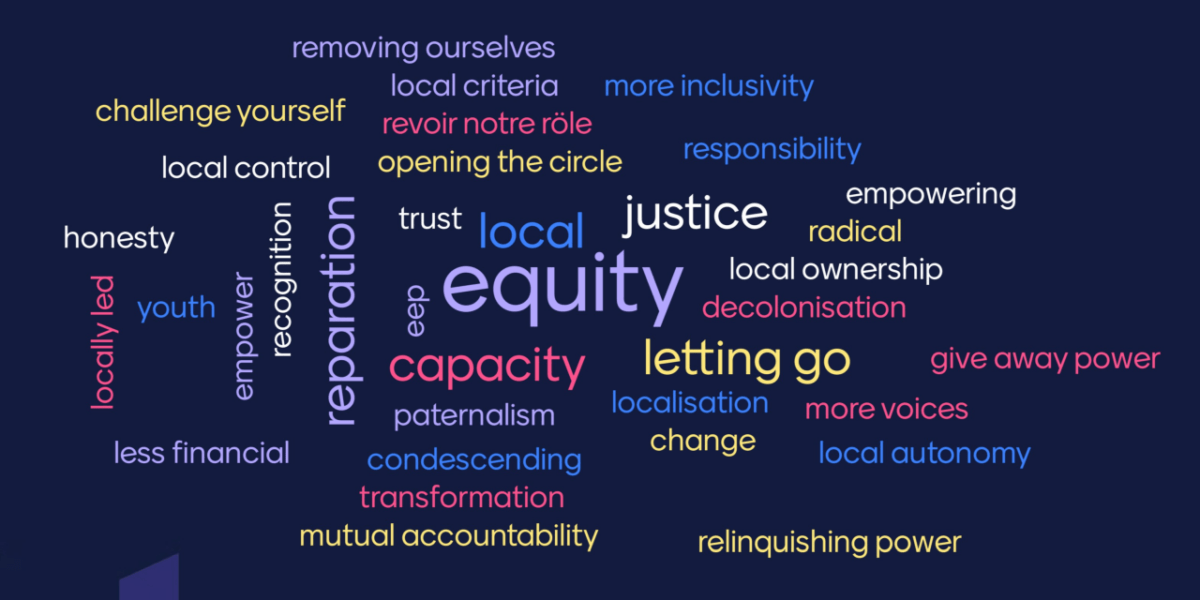
The morning keynote presentations, moderated by Leila Moumouni-Tchouassi from Cooperation Canada’s Anti-Racism Hub, focused on the effectiveness and ethics arguments underpinning the power shift agenda. First, Andreanne Martel, Director of Spur Change, a program of the Inter-Council Network, presented the main findings from a study analyzing the impact of the Covid-19 pandemic on CSOs’ relationships with their country partners. She reported that pandemic-induced changes revealed effectiveness gains yet did not result in a broad acceleration of localization, noting that it was a missed opportunity to transform practices and mindsets. The second keynote speaker, Themrise Khan, independent development professional and researcher, addressed the ethics argument, posing localization as a contrived term that singles out people and organizations outside Global North countries as locals. From her perspective, shifting power is about giving away and letting go, which goes beyond decolonizing the aid system.
In the afternoon, the moderator, Marlen Mondaca, Vice-President of Programs and Partnerships at Canadian Feed The Children, brought the conversation home, focusing on the Canadian landscape. After an update on the OECD DAC Recommendation on Enabling Civil Society by Brian Tomlinson, CEO of AidWatch Canada, participants heard from Global Affairs Canada about the Grants&Contributions initiative (by Karl Gagné, Director of Policy Integration for the Transformation Initiative) and the plans to develop some policy guidance on localization (by Kim Joslin, Assistant Director at the International Assistance Policy Coordination Division). Following Global Affairs Canada, John Clayton, Director of Programs and Projects at the Samaritan’s Purse Canada, provided an overview of the legislative environment constraining Canadian charities working with non-charities, including country partners. To close the day, participants heard from Nancy Lafrance, Director of the Volunteer Cooperation Program at CECI, how her organization opened Board membership to country partners and moved leadership positions to the Global South, while simultaneously adapting its corporate culture and language.
The second day allowed the workshop participants to engage in interactive sessions, starting with a SWOT analysis of Canadian CSOs. The participants then conducted a visioning exercise about a future support structure (be it a dedicated center, working group or a different model) that would enable CSOs to leverage strengths and opportunities, while filling gaps and addressing threats along the power shift journey. The visioning exercise ended with the group reflecting on the possible functions that a support structure would serve, weighing its benefits against the challenge of funding and sustaining its operation. The group agreed to pursue the reflection through a smaller task force in the coming months. Cooperation Canada is committed to working closely with civil society and across the political spectrum to advance the operationalization of the power shift agenda and translate Canada’s feminist leadership into ethical and equitable partnerships with global actors.
Cooperation Canada would like to thank member organizations who supported this event, namely Canadian Feed the Children; Canadian Red Cross; Canadian Foodgrains Bank (CFGB); Centre for International Studies and Cooperation (CECI); Oxfam Quebec; and The Primate’s World Relief and Development Fund (PWRDF).
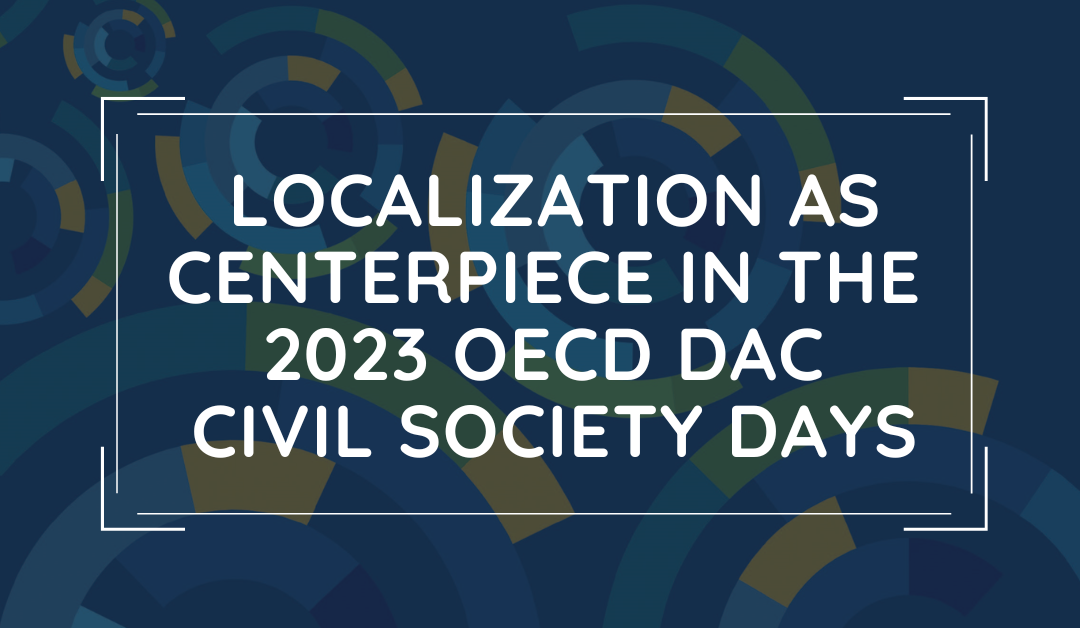
by Cooperation Canada | Jul 5, 2023 | Localization, News
On June 19-21, 2023, the OECD Development Assistance Committee (OECD DAC) held its Civil Society Days in Paris. This biennial forum explores challenges facing civil society and builds bridges across a diverse set of development actors to engage with one another, identify opportunities and find solutions to better enable civil society as independent development actors. The 2023 edition, focused on the theme “Enabling locally-led transformation and balancing partnerships”, brought together OECD DAC government representatives, including officials from Global Affairs Canada, and civil society actors from around the world, including Brian Tomlinson, Executive Director of AidWatch Canada, and Co-chair of Cooperation Canada Localization Working Group. The theme of these meetings demonstrated the recognition of the imperative to shift power and decolonize the international cooperation architecture.
Highlights
The participants were able to discuss the issue of locally-led transformation during a roundtable and related technical workshops.
Roundtable
The roundtable aimed at generating ideas for further action to maximize civil society’s contribution to achieving the UN 2030 Agenda. As reaffirmed by the roundtable speakers, essential to such action is the commitment to rebalance power relations and find common ground for equitable partnerships with and between civil society actors. The representative of Global Affairs Canada (GAC) explained Canada’s motivation in the localization agenda is its long tradition and interest in effective cooperation, as illustrated by the long-standing Canada Fund for Local Initiatives which provides funding for small-scale projects in more than 120 countries eligible for official development assistance. GAC also referred to the five-year Grants & Contribution transformation process as a most transformative area of work.
Another speaker, a CSO leader from East Africa, noted the persisting struggles in soft (less concrete) issues such as terminology and modes of collaboration when engaging on these important issues. Because words matter, localization and locally-led development should not be used interchangeably as they point to different contexts and challenges. The speaker also stressed the importance of recognizing and discussing tensions between equal and equitable partnerships: colonial legacies cannot be ignored so expectations of all actors must reflect the historic power imbalance.
Technical workshops
Six technical workshops took place on issues, including: ranging from peer learning of locally-led development; development communications; democracy and autocratisation; civil society engagement in climate action; and progress on the implementation of the DAC Recommendation on Enabling Civil Society in Development Co-operation and Humanitarian Assistance.
The DAC Recommendation on Enabling Civil Society in Development Co-operation and Humanitarian Assistance
The 2021 OECD DAC Recommendation on Enabling Civil Society in Development Co-operation and Humanitarian Assistance (the “Recommendation”) is the first international framework adopted to guide and incentivize development co-operation and humanitarian assistance providers in supporting civil society actors in donor and partner countries, and was a key point of discussion during the Civil Society Days. Though not strictly binding, the Recommendation allows political attention to be drawn to issues relating to the enabling environment for civil society, and commits those that have signed on to take action around its three pillars:
- Respecting, protecting and promoting civic space;
- Supporting and engaging with civil society; and
- Incentivizing civil society effectiveness, transparency and accountability
The UN Special Rapporteur on Freedom of Peaceful Assembly and of Association participated in the meeting, and lamented the growing threats of human rights defenders. He pointed to the synergy between empowering civil society actors, including through core financial support, and the quality of their contributions to human development. A 2022 Report of the Special Rapporteur states that “civil society involvement in and contributions to the achievement of the purposes and principles of the United Nations, including the realization of human rights and sustainable development, are paramount, and States should exert all efforts to support, rather than inhibit, civil society’s work”. Participants observed that the strength of the OECD DAC Recommendation can be bolstered by ensuring that it is referenced in other high-level documents, as is the case in the Special Rapporteur’s report.
What to expect next
Strengthening of the dialogue between the DAC and civil society
The adoption of the OECD DAC Recommendation has spurred new impetus for adherent countries and civil society to collaborate on this agenda. Enhancing the dialogue between the DAC Community of Practice on Civil Society (CoP) and the DAC-CSO Reference Group (CSO RG) is in line with the spirit of the Recommendation and has great potential to facilitate knowledge sharing and foster progress.
Case in point: in 2023, the DAC-CSO Reference Group conducted a survey of its members, to identify civil society and donor initiatives and actions advancing the principles in the Recommendation. Rather than attempting to assess progress made in implementing the Recommendation, the survey aimed to identify examples of innovation and positive practice that can encourage learning and exchange and support more effective implementation of the Recommendation going forward.
59 respondents completed the survey, with 34 responses (58%) from partners in the Global North and 25 responses (42%) from partners in the Global South. Many respondents described their engagement in initiatives to raise awareness of the Recommendation and develop CSO approaches to facilitate its implementation. Such initiatives included organizing awareness-raising and advocacy events on the Recommendation, as well as pedagogical actions to enhance CSO capacity to use the Recommendation. Respondents also mentioned initiatives to implement the third pillar of the Recommendation, including by engaging in internal dialogues on new ways of working that prioritize shifting funds and leadership to local partners, and otherwise acknowledging the Recommendation in programs to promote empowered and equitable partnerships.
Brian Tomlinson, Executive Director of AidWatch Canada, had this to say about the 2023 Civil Society Days:
“This dialogue set an important precedent as our first meeting with the full membership of the Community of Practice for Civil Society. Hopefully we can find avenues for a regular engagement in the coming years, leading up to the first five-year assessment of progress in implementing the Recommendation in 2025.”
Review of the Recommendation
The first five-year assessment of progress in implementing the Recommendation will take place in 2025. In the meantime, the OECD is working on toolkits to help DAC members translate the provisions of the Recommendation into practice. The first toolkit, released in 2023, is about strengthening local ownership and partner-country CSOs as independent development and humanitarian actors, a key aspect of a broader localization agenda. The second toolkit will focus on shifting power and empowering partnerships, addressing additional provisions of the Recommendation that related to localization. Open consultations on the second toolkit should be announced in the coming months. Cooperation Canada will continue to inform its members, engaging the membership and Global Affairs Canada on opportunities to accelerate progress on the Recommendation implementation.
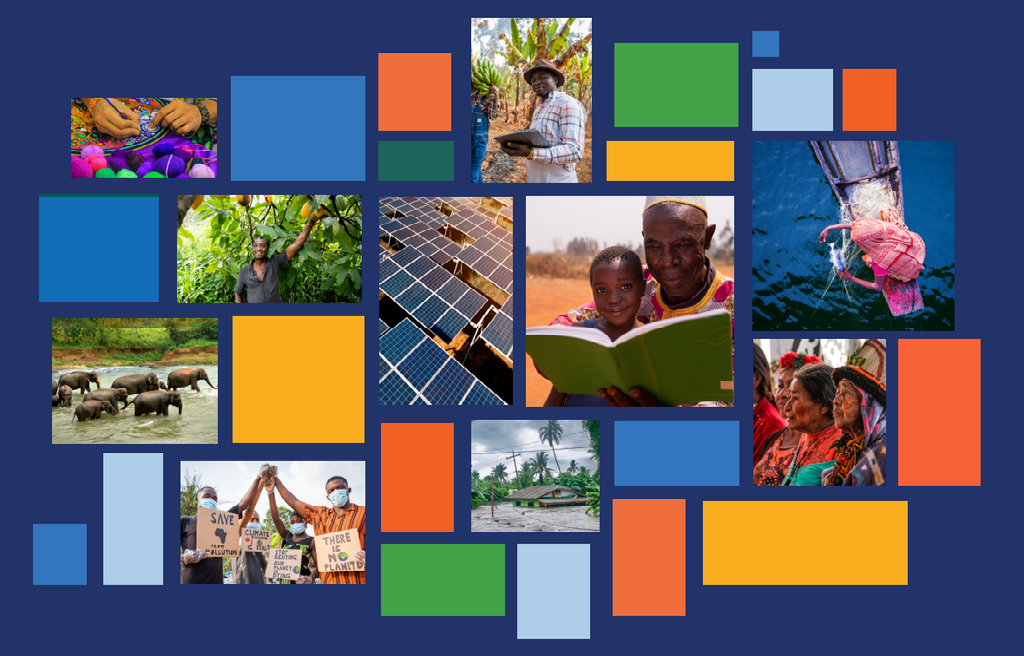
by Cooperation Canada | Mar 16, 2023 | Localization, News, Publications
The 60th anniversary edition of the Development Co-operation Report takes stock of the multiple global crises that put current models of development co-operation to a radical test. The report critiques the failure to address the root causes of underdevelopment, calling out colonial legacies and racism in the sector. The report, particularly in its 14th Chapter co-authored by AidWatch, emphasizes how the current system and practices disadvantage Global South civil society organisations and proposes priority actions: Deliver existing commitments; Support locally led development; Modernize business models, and Balancing power relations in decision making.

by Cooperation Canada | Feb 23, 2023 | Direction and Control, Localization, News, Publications
Canada’s charitable organizations are regulated by the Canada Revenue Agency (CRA) guidance CG-002, dubbed ‘direction and control’ emanating from the Income Tax Act (ITA). Following amendments to those provisions introduced in the 2022 Federal Budget, the CRA revised the guidance outlining how registered charities can make “qualifying disbursements” to non-qualified donees (NQDs) and invited stakeholders to comment on the draft guidance between November 2022 and January 2023. In its submission to the CRA, Cooperation Canada appreciates the efforts made to address sector’s concerns about the Direction & Control approach, yet stresses that the guidance over emphasizes risk and imposes onerous requirements for charities.
Cooperation Canada highlighted sections of the draft guidance that require significant revision, such as those on risk assessment, accountability tools, and pooled funding. The risk assessment framework is particularly problematic for organizations working internationally. The guidance does not specify the risk that the CRA tries to minimize but uses language that closely resembles that used in risk mitigation measures for terrorism financing. By requiring charities to assess the level of risk at the outset of the grant, the guidance may discourage charities from partnering with young or small organizations.
Among the sections that need further clarification, Cooperation Canada recommends that CRA examines the clauses on directed giving and security concerns. Finally, the submission notes that the guidance is missing some important definitions. Several of these points have also been raised by others in the charitable sector.
For other opinions on the subject:
The charitable sector has long been demanding more fairness, equity, and equality of opportunity. The draft guidance unfortunately contains potential pitfalls, which may have the unintended effect of perpetuating direction and control practices, despite the sector’s quasi unanimous distaste for that paternalistic concept. A true alternative should entrench a culture of ethical relationships and respectful collaboration in the regime governing the activities of charities alongside partner organizations in Canada and abroad.




